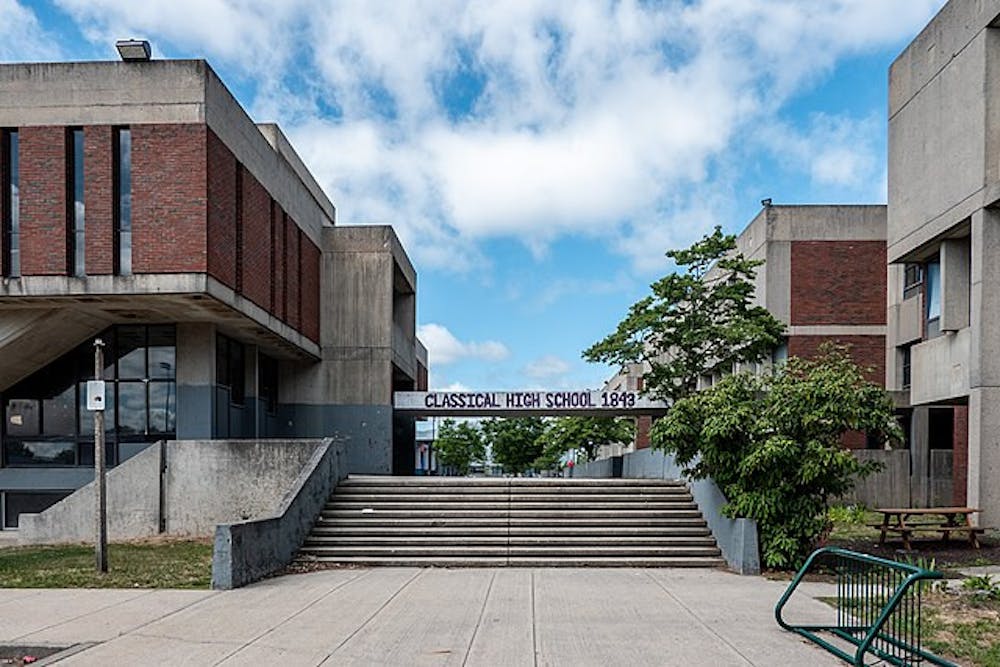Providence Public School District educators and stakeholders shared cautious optimism about Brown’s recently-announced initiative to help prepare local students for selective four-year institutions and to increase PPSD enrollment at the University. The initiative, announced in a press release from President Christina Paxson P’19 Oct. 25, is part of a broader plan to increase financial aid and access to the University, The Herald previously reported.
“We believe that every student in Providence deserves access to a first-rate education, and launching and sustaining a successful college-prep program will add to an extensive array of efforts by Brown faculty, staff and students in partnership with local stakeholders to support education in Providence schools and others in the state’s urban core,” University Spokesperson Brian Clark wrote in an email to The Herald. In conjunction with efforts by city schools and other local organizations, the University’s initiative aims to help increase the proportion of Providence high school graduates who enroll in college from its current rate of 54%.
“It would be an incredible opportunity,” Maribeth Calabro, president of the Providence Teachers Union, said of the future pipeline. “I’ve always said that Brown University needs to save spaces for (PPSD) students to be part of their educational community.” She added that attending a selective university would help PPSD students eventually be more successful in the workforce.
Despite being excited about the prospect, some within PPSD believe the measure is a small step given the University’s position within the city. “I think it has good intentions. I think the process is long overdue,” Precious Lopez, co-executive director of the Providence Student Union, said. She added that she felt this way because of the University’s $6.9 billion endowment and its exemption from paying property taxes to the City due to its status as a nonprofit organization.
Rémy Poisson ’22, a Classical High School graduate who is earning a Brown/Rhode Island School of Design Dual Degree, also said the University has a responsibility to support PPSD. “There’s a moral obligation because Brown is not really paying taxes,” he said.
Clark pushed back against the notion that the University does not pay property taxes. “It’s important to clarify that the statement that ‘Brown does not pay property taxes’ is factually inaccurate,” he wrote to The Herald. “We pay municipal taxes for real estate we own and lease to commercial tenants, and transition payments for former commercial properties acquired by Brown and now used for institutional purposes — more than $2.5 million in the last fiscal year alone,” Clark wrote. “That’s in addition to $3.4 million in voluntary payments that we make to the city each year and $2.3 million in annual city and state fees.”
The University also pays voluntary contributions to the city government through the R.I. Payment in Lieu of Taxes program, which Clark wrote accounted for “27% of the taxes that would be paid on University and hospital property used for institutional purposes.”
Lopez also underscored the need for community voices to be consulted in the pipeline development. “I’d like to know who these community members are that they’re talking to because they’re not talking to community orgs — at least PSU hasn’t gotten to the table,” she said.
According to Clark, the University is still in “the earliest stage of turning the vision for a robust college-prep program into a plan that outlines what a successful initiative would look like and how it would operate.” He added that the University will consult “key stakeholders” in the process, such as PPSD leaders, students, teachers and administrators, as well as the Rhode Island Department of Education.
Calabro said she hopes that these college preparation efforts include students from all across the district. “We have phenomenal students in every building, and so I wouldn’t want anybody to be missed, especially with this kind of opportunity,” she said.
Poisson similarly shared a desire for inclusivity across the district and concern about the pipeline potentially exacerbating educational inequity in the city. “A concern would be if (pipeline leaders) prioritize certain schools,” he said. He explained that Classical, which requires an entrance exam for admission and is widely considered PPSD’s most competitive high school, is already “sort of a feeder” to the University. Since Classical has selective admission, there is already “elitism in that process,” he said. If the program contributes to the perception that going to Classical will get a student admitted to the University, he added, it could make that inequality between Providence high schools worse.
Poisson said that he knew that many Providence students may not want to stay in their home city for college, so he believes that it is a good idea for the pipeline to facilitate increased access to universities other than Brown.
Calabro also emphasized that the pipeline and college preparation efforts must start with young students. “We need to have Brown dive deep into the practices, instruction and curriculum at the high school level, and even as low as the middle school level, so that we can support all of the instruction and achievement that is required to get into a university such as Brown.”





